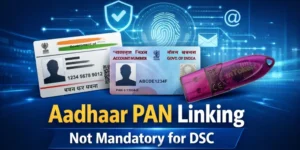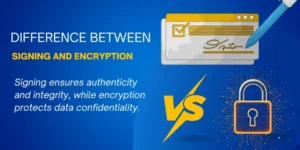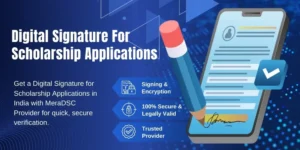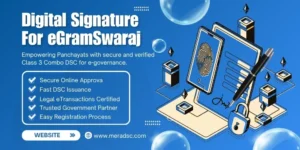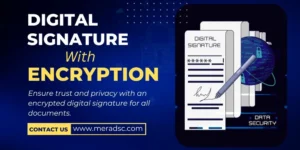An eProcurement Digital Signature is an electronic key used to securely transact and verify the individuals or organizations on the various digital platforms of e-Tendering. It is the authentication that ensures the bidder’s presence and maintains the integrity of document submission. Through this orientation of digital signatures, a bidder can participate in government tendering and bidding for purposes of a secure and legitimate approach.
Benefits of Using eProcurement Digital Signature
Using a digital signature certificate for eProcurement offers numerous benefits, including:
Enhanced Security
Digital signatures use advanced encryptions to secure online transactions, preventing all kinds of tampering, forgery, or unauthorized access to sensitive documents.
Legal Validity
A digital signature is legally binding under the IT Act, 2000. It ensures that your bid submission holds legal recognition in all e-tender platforms.
Authentication
Referring to tender-related documents, each signature is unique to a particular person: a signature proves someone has the authority to sign the tender document.
Time Efficiency
Bidding for tenders online using DSCs eliminates the need for physical document submissions, saving time and resources.
Eco-Friendly Process
By replacing physical paperwork with digital alternatives, eProcurement supports a paperless, environmentally responsible approach.
Cost Savings
Reducing courier and printing costs, especially for bidders participating in multiple tenders across India, significantly cuts operational expenses.
How Does an eProcurement Digital Signature Work?
Working on digital signature certificates with asymmetric cryptography involves two separate keys: one public key for encryption and the other private key for decryption.
- The private key, kept securely in your USB token, signs a particular set of documents.
- The public key will be used by the recipient (read: e-tendering portal) for verification of the signature.
Signing a document using a DSC produces a unique digital fingerprint-the fingerprint cannot be forged or altered without invalidating the author’s signature; this ensures the integrity and authenticity of your submitted documents.
Which DSC is Required for Tenders?
Class 3 digital signature certificates are mandatory for e-tendering portals in India, including state and central government procurement systems. These certificates are issued to individuals and organizations after a full verification process.
Types of DSCs Used in e-Tendering:
- Class 3 Individual DSC: Used by individuals authorized to sign tender documents on behalf of their organization.
- Class 3 Organization DSC: Issued in the name of an organization with the authorized signatory’s name included.
- Class 3 Combo Certificate: Includes both signing and encryption capabilities, preferred for e-tender platforms that require document confidentiality.
Most platforms, such as CPPP (Central Public Procurement Portal), GeM (Government eMarketplace), IREPS, MSTC, and state-level eProcurement portal require a Class 3 DSC with signing + encryption.
How to Perform Eprocurement Tender Key Registration?
Eprocurement Tender Key Registration refers to linking your DSC with the e-tender portal to ensure your submissions are securely authenticated.
Follow these steps:
- Access the e-Tender Portal – Log in to the official site using your bidder credentials.
- Insert the USB Token – Ensure your Class 3 DSC is plugged in and drivers are installed.
- Navigate to the “Digital Signature” Section – Go to “Digital Certificate Registration” or a similar menu.
- Select Certificate – Choose the correct DSC (signing + encryption).
- Submit for Mapping – Once selected, the portal will fetch your certificate and link it to your profile.
- Confirmation – After successful registration, the portal will allow you to digitally sign tender forms, financial bids, and related documents.
Keep your DSC renewed and updated before expiry. Most eProcurement portals do not allow expired certificates to function.



